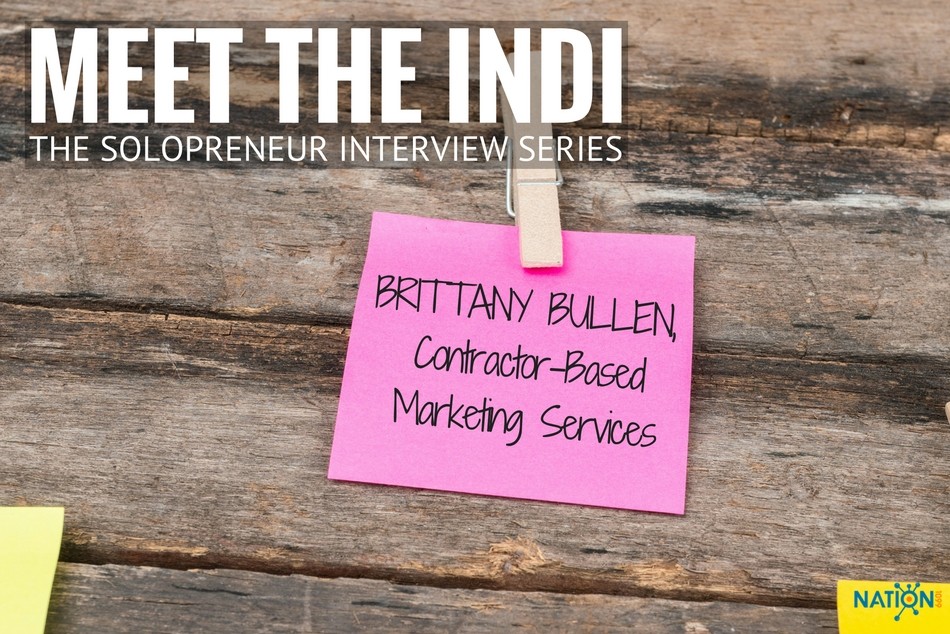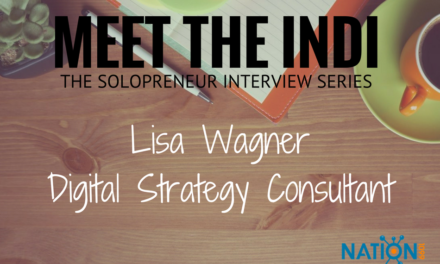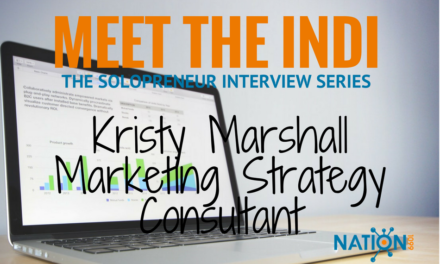For many of us finding our place in today’s gig economy, there was some set of circumstances that pushed us in an unexpected — but ultimately wonderful — direction. In her article, How a Really Dumb Promise Turned Into a Company, Brittany Bullen expresses how chance led her to a uniquely collaborative endeavor.
“The trick to entrepreneurship is that very few of us can build a scalable business alone,” she writes. “Opportunity often presents itself in a moment of chaos and in order to capitalize on that opportunity, we need each other.”
Bullen’s piece tells of her journey from stay-home mom to freelancer to founder of NerdyGirl.co, a marketing services company with a contractor-based business model. Bullen’s story embodies some of Nation1099’s most fundamental beliefs — that although we are indeed strong as independents, we are even stronger as a community.
Or, as Bullen writes: “When we pool our talents, connections and resources, we can do things like build impressive content marketing agencies from our laptops and smart phones, in our jammies, even with little ones tugging at our heels.”
So of course we wanted to catch up with Bullen, to learn how NerdyGirl.co is doing now. Living near Salt Lake City, Utah, with her husband and three children, Bullen describes her mission in life as helping “entrepreneurs find the tenacity, the tools and the team to sell more stuff, serve more people and just plain be happier.”
Here Bullen talks about how she stays in constant pursuit of this mission through private consulting, seminars, online courses or NerdyGirl.co’s marketing services — and why she is a self-described geek about marketing and human behavior.
Briefly tell us about your services and your clients.
We provide a fully managed freelance solution, so rather than working with an agency, business owners can come to us and we’ll find and manage all the freelance talent they need.
It saves the business owners time and money, but they don’t have to sacrifice the full-service nature of what they’d get from an agency.
To what extent do you use 1099ers in your business model?
All of our talent are independent contractors.
What is your process for choosing freelancers? What do you look for in a 1099er?
We have people approaching us all the time wanting to work for us, so many that I’ve had to put our hiring process on hold. That said, it’s sad because I want to find work for everybody! That’s why I’ve put together a little free course to help freelancers get work more successfully.
For example, you do need to have a portfolio — even if you haven’t been published yet. I discuss how to do that in the video, as well as how to set yourself apart as a specialist, which also helps a ton.
Even though we’re not actively hiring now, I will say, that from time to time someone really nails the stuff I teach there and I let them sneak on to our standby list.
Let’s talk about that “dumb promise” you made years ago: you offering a client to write 100 blogs in 3 weeks. At what point did you decide you weren’t going to write all of them alone?
Uh, after the first post? Haha yes, I discovered pretty quickly that corporate blogging wasn’t for me. This was a client that came my way because of a personal connection — a health insurance co-op that had a big fat marketing budget to play with. Gotta love those types of clients, eh?
Related topic: When Should a Consultant Hire Subcontractors?
NerdyGirl started as NerdyGirl Writers. Do you still use only subcontractors?
We do still exclusively use subcontractors because that’s the way our people prefer to work. Most of our “Nerds” are at-home moms with young kids, so they like being able to take jobs when they can and turn them down when they can’t. I love the flexibility we can offer by working that way.
What are some challenges you face with that business model?
The biggest downside to not working with employees is that there’s always the possibility of people being flaky, and that does happen. That was why it was really important when we added account managers to our client experience — that way we can manage turnover and late delivery and all the unpredictability that can sometimes come with working with contractors, so our clients don’t have to worry about it.
What is the first thing you do at the start of your work day?
Depends on the day. Once a week, I attend a networking breakfast that I absolutely love. Sometimes I do Facebook Live videos. Sometimes I record interviews for podcasts. I like to mix it up.
How do you keep yourself focused throughout the day? Do you have any special rituals or habits?
I have three little boys at home, so I like to practice the “lean in” method to handling disruptions. Rather than swatting them away like pesky flies, I give them my full attention, do my best to address their needs quickly and kindly, and then respectfully remind them that I’m working and ask them to respect that time. I find that leaves everybody a lot happier!
How do you mentally move on at the work day’s end? Any tips for maintaining work/life balance?
Yes! I actually just the other day made a Facebook Live video called 12 Happy Family Hacks for Momtrepreneurs that would be just as effective for anyone who works at home.
One great trick I mention in the video is the family “blitz clean”, where everybody does as much cleaning as possible in just 15 minutes, set to fun music.
Further reading: Don’t Take Your Laptop to Bed: Work-Life Balance for the Solopreneur
What self-promotion strategy do you think other solos do not take advantage of?
I think the vast majority of us have only just scratched the surface of the potential that exists within our existing network. Just because someone might never be a customer doesn’t mean they couldn’t be an excellent referral source for you.
The challenge is that most of us don’t know how to have those conversations effectively so they end up resulting in more new business for us. I teach about that extensively in my online course, The 60 Client Year.
The rising generation tends to value freedom more than they value security . . .
In that course, we talk about how one of the worst things most people do when looking for referrals is to say to people “who do you know who would be a good fit for my services?” This doesn’t work because it puts all the burden on them.
You need to make it as easy as possible for that person to help you, and that only happens when you’re super specific about what/who you’re looking for.
What do you think the biggest mistake you’ve made that other independents might learn from?
Don’t assume that just because “everyone” is looking for jobs in one particular place, that implies you should be. In fact, in my experience it’s actually quite the opposite. The places where no one else is looking are the BEST places to find jobs.
What was the best decision you think you made in your career that others might gain insight from?
Figuring out how to differentiate myself from my competitors!
We’re especially into the transition from going to growing. What are successful practices you see solopreneurs use to grow their businesses?
I hate to sound like a broken record, but I have a fantastic resource that speaks to both this question and the previous question. It’s a free audio training called E-Sanity: Earn Six Figures From Home (and FEEL AWESOME while you do it). It goes through some of the major mistakes I made on the road to my first six figures, as well as the step by step process it takes to successfully (and sanely) make it there.
I’ll outline a few of them here — first, you have to get your mind right (become the kind of person who CAN succeed). Then, you have to get really good at listening — figure out what your market wants and how they talk about it. Then you have to learn to manage your time and quit doing stuff that doesn’t work. There’s a bunch more in the training but a lot of it starts there.
What trends are you noticing in the gig economy?
Well, for one, it’s growing like weeds. Everybody and their dog is going freelance because the rising generation tends to value freedom more than they value security, which I think is actually super cool.
More on this: The Future of Work Is the Future of Self: How the Work In Place Movement Is Supporting Remote Workers
However, what it means is that the freelance world has never been more crowded and it’s now more important than ever to figure out how to not just be good at what we do, but to be great at selling what we do.
Lastly, you’ve called yourself a geek about marketing and human behavior. Have you always been like that? And why does it interest you so much?
Yes. I can remember being like 6 years old, pondering the mysteries of life and why we do what we do. I think (sad as this is) the main reason I started studying this was the whole “rejection breeds obsession” idea.
I was never popular as a kid. I was chubby and not that good looking, and I didn’t know how to get people to like me. So I started researching what gets people to like people, and the rest was history!











